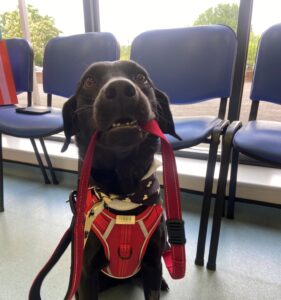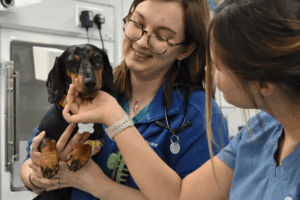Flat-faced dogs and cats, also known as brachycephalic breeds, are undeniably popular thanks to their endearing smooshy faces and charming characters. These animals are known for their great personalities and form affectionate bonds with their owners.
Unfortunately, the physical features that tend to draw people to these breeds, like their flat faces, can mean they’re at greater risk of developing particular health problems down the line.
If you’re considering bringing a brachycephalic breed into your family, or have one already, it’s important to be aware of the common health issues so that you can seek the necessary treatment where required.
What are the common brachycephalic breeds?
The term ‘brachycephalic’ comes from the Greek words meaning ‘short’ and ‘head’ and therefore describes animals whose faces appear flattened or squashed. Because of the unique shape of their heads, these breeds’ typically have narrow nostrils and smaller airways.
Some of the most popular brachycephalic breeds in the UK include:
- Pugs
- French Bulldogs
- British Bulldogs
- Boston Terriers
- Cavalier King Charles Spaniels
- Shih Tzus
- Boxers
- British Shorthair Cats
- Persian Cats
- Exotic Shorthair Cats
Common problems and how we can help
Breathing problems
Flat-faced dogs and cats can experience difficulty breathing, which can be extremely distressing. The clinical term is known as Brachycephalic Obstructive Airway Syndrome (BOAS) which refers to how their shortened heads can lead to restricted airflow.
These breeds have shorter muzzle bones in their skulls than animals with longer snouts, but often the soft tissue around the mouth, nose and throat is the same. This means the airway becomes narrowed or partially blocked as the tissue squeezes into a smaller space. Their windpipes and nostrils can also be deformed and narrow, so less oxygen can be taken in with each breath.
Symptoms to look out for include (but are not limited to):
- Snorting and snoring (when at rest and during exercise)
- Poor exercise tolerance
- Poor heat tolerance
- Sleep apnoea
- Retching, regurgitation and vomiting
If you own a flat-faced breed, it’s important to keep an eye on their breathing during exercise and hot weather, as they struggle to effectively cool themselves down by panting. This puts them at greater risk of overheating and suffering from heatstroke.
How St Kitts Vets can support brachycephalic breeds with breathing problems
We’re proud to have a close relationship with the team of dedicated peripatetic referral surgeons at ProVetSurg, who have partnered with us to provide our clients with a cost-effective assessment and treatment pathway for animals suffering with BOAS.

Our process includes detailed pre-operative assessments to determine whether surgery is required, along with extensive plans to minimise the risk of complications should this route be recommended.
You can find out more about our BOAS surgery here.
Dental problems
Overlapping and overcrowding teeth is unfortunately expected with flat-faced breeds, which can increase the risk of decay and gum (periodontal) disease and cause severe pain, as well as lead to other serious health problems, such as heart disease.
This is because flat-faced breeds have the same amount of teeth as those with longer snouts, but not enough space to accommodate them. Research by the Royal Veterinary College found flat-faced breeds have 1.25 times the risk of dental disease compared with breeds with medium-length skulls.
Symptoms to look out for include (but are not limited to):
- Bad breath
- Swollen or bleeding gums
- Difficulty eating
- Weight loss
How St Kitts Vets can support brachycephalic breeds with dental problems
Across our four practices, we are fully equipped with the equipment needed to diagnose and treat a range of dental conditions. Our facilities cover everything from dedicated dental suites and X-rays to descaling and polishing equipment.
Eye problems
With their flat faces and shallow eye sockets, Brachycephalic Ocular Syndrome (BOS) is a common concern amongst these breeds. Prominent and bulging eyes can mean their tear film doesn’t spread properly and they can easily develop eye ulcers, which can result in complications if left untreated.
Symptoms to look out for include (but are not limited to):
- Redness or clouding of the eye
- Eye watering
- Excessive blinking/squinting
- Rubbing at eyes with a paw
- Excessively widened eyelids
- Tear staining
- Dry eyes
- Eye trauma, such as ulceration
- Damage to the surface of the eye, impacting sight
- Entropion (where eyelids fold inwards and scratch the eyeball)
Meet Dotty, who was suffering from BOS
To help with Dotty’s eyes, a procedure called a medical canthoplasty was performed that makes the eye opening smaller and prevents any future problems. You can see what a huge difference the surgery has made for Dotty in her before and after below!
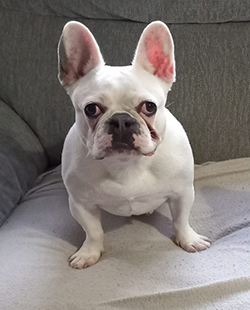
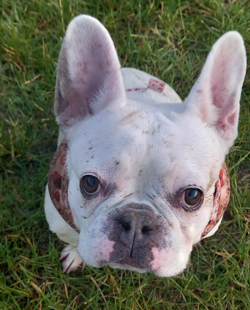
Ear problems
The shape of their heads means brachycephalic breeds often have narrowed ear canals. Their poorly ventilated deep skin folds around their ears can often lead to yeast infections too.
Symptoms to look out for include (but are not limited to):
- Scratching or rubbing ears
- Head shaking
- Foul smelling discharge from the ears
- Redness and inflammation
- Sensitivity or pain
Skin issues
With plenty of skin folds and wrinkles, flat-faced dogs and cats are at higher risk of allergic skin disease, infections and chronic itching, which can cause great discomfort. In most cases, lifelong medication is required.
Symptoms to look out for include (but are not limited to):
- Itchy skin
- Redness and inflammation
- Hair loss
- Discharge or pus
- Unusual odours
- Hair loss
Spinal deformities
Flat-faced breeds with coiled or short tails, are at higher risk of spinal deformities. This can affect their ability to walk and cause paralysis of the back legs.
Symptoms to look out for include (but are not limited to):
- Wobbliness
- Weak back legs
- Signs of muscle wastage
- Pain
- Changes in walking
- Incontinence
Heart problems
We’ve looked at the breathing difficulties flat-faced breeds can face, but this can also put a strain on their hearts. Struggling to breathe results in a lack of oxygen in the bloodstream, which makes heart problems more likely.
Symptoms to look out for include (but are not limited to):
- Difficulty breathing
- Coughing
- Restlessness or distress
- Reduced appetite
- Swelling and fluid retention around the heart
- Fainting or sudden collapse
How St Kitts Vets can support brachycephalic breeds with heart problems
Vet Steve Williams and the team at our Hartley Wintney practice have been providing cardiology services for patients for the last 10 years. Steve himself has a particular interest in veterinary cardiology and has undergone significant training in this area.
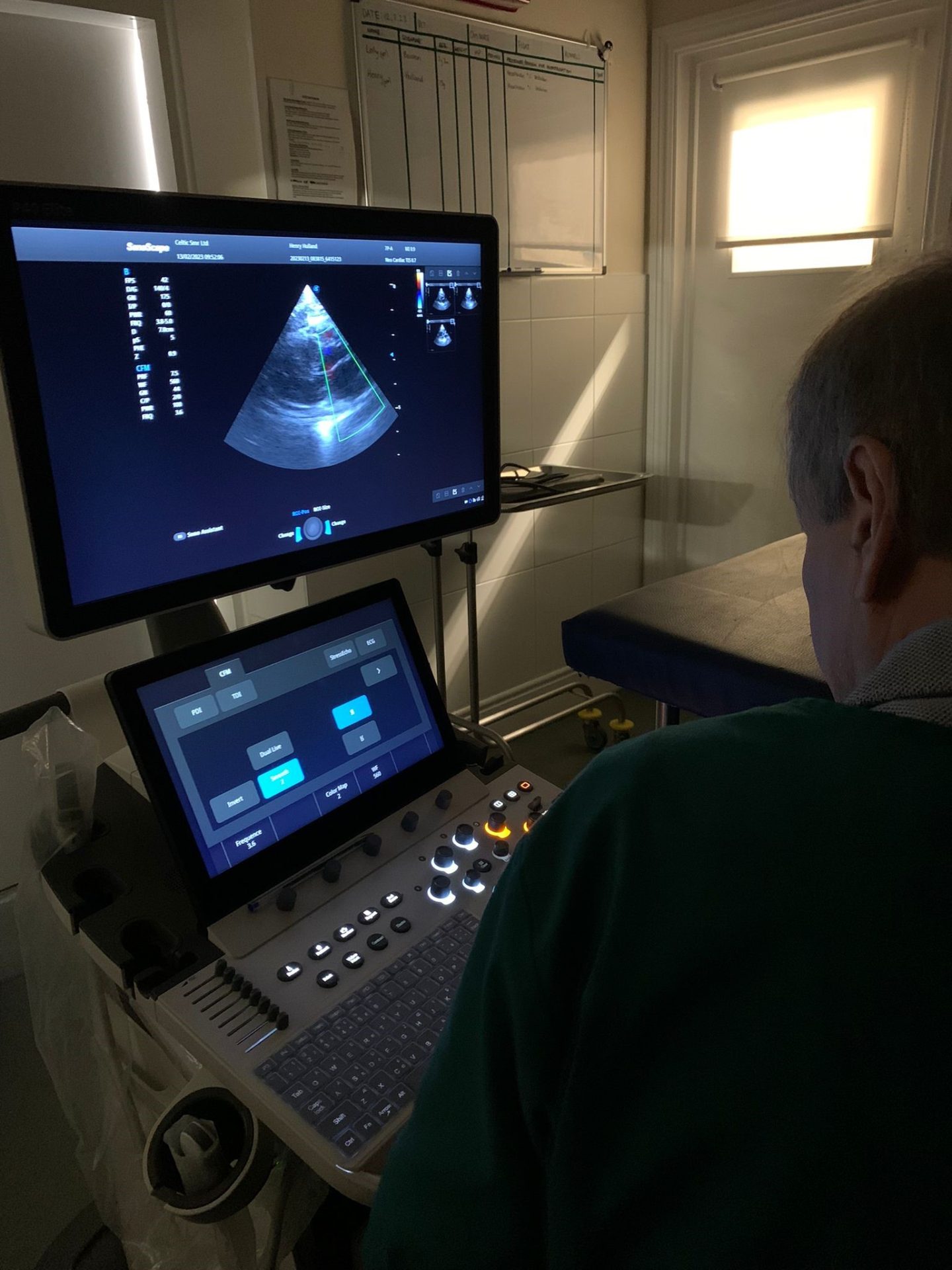
All our cardiology investigations are performed using modern specialist equipment, including high quality ECG, X-rays and ultrasound. We also have use of a state-of-the-art CT scanner at our Basingstoke practice.
You can find out more about our veterinary cardiology here.
Neurological problems
Brachycephalic breeds can suffer from neurological (brain) problems because of their compressed skull shape. One of the most common, and unfortunately painful conditions, is Syringomyelia, where cavities or cysts form in the spinal cord. It is most often seen in Cavalier King Charles Spaniels.
Symptoms to look out for include (but are not limited to):
- Head tilting
- Loss of balance
- Seizures
- Weakness or paralysis
- Behavioural changes
Unfortunately, owners of flat-faced breeds are likely to need to dedicate more time and effort in caring for their health than most other breeds. There are things you can do to improve their general wellbeing though, including controlling their weight and being mindful of things such as exercise in warm weather.
If you have any concerns about your pet’s health, please contact your local practice.
St Kitts Vets Hartley Wintney: 01252 844044
St Kitts Vets Basingstoke: 01256 844944
Crookham Park Veterinary Centre: 01252 913990
Firgrove Veterinary Centre: 01252 877799

